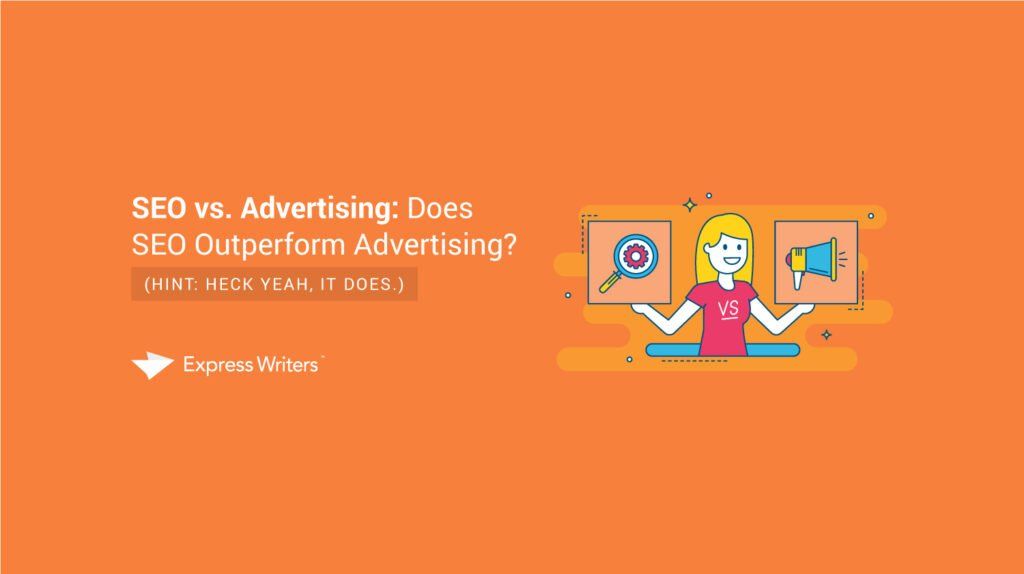SEO vs. advertising.
It seems like a focus of hot debate … but is it really?
Marketers selling you advertising space would love to debate the finer points and point out all the technicalities. But that’s exactly what they are – technicalities.
With no real foot to stand on in 2021.
According to research by Bright Edge, SEO makes up 53% of all web traffic that your website experiences. Just over half of your readers and customers find you in Google. 
Paid search? A measly 15%. 
But if that one data point is not convincing, plenty of other research out there backs it up.
The debate of SEO vs. advertising isn’t even a thing. Here’s why an SEO content marketing approach outperforms paid search, and the statistics that prove it.
4 Big Reasons Why SEO vs. Advertising Isn’t Even a Real Debate
Did you know that total Google searches more than doubled last year?
In March 2020, we averaged around 3.6 billion Google searches per year. You can now hop onto Worldometers and watch it hit 7 billion every day. 
Show that to the people groaning about how SEO is dead. SEO will be dead when search engines are dead, and Google is going nowhere anytime soon.
Research by @brightedge says SEO makes up 53% of all web traffic to your site. Paid search makes up a measly 15%.  This + 4 more reasons why SEO outperforms ads via @JuliaEMcCoy
This + 4 more reasons why SEO outperforms ads via @JuliaEMcCoy 
But the ubiquity of Google use is just one reason why SEO is such a better investment than paid advertising. Here are four more reasons why a strong SEO strategy will outperform even the cleverest of advertising.
1. SEO is the Long-Term Game
The internet is an amazing tool, chock full of mind-blowing opportunity … but there’s a catch that a lot of people seem to still not get in 2021.
Success online requires consistency and long-term planning. Or as I like to put it, .
SEO is that element of time in your work. The longer you focus on producing high-quality, keyword optimized content that attracts and delights your audience, the more you’ll build a presence in the search engines. In turn, the more you’ll land in front of eyeballs as Google rewards you for your hard work.
And when I say long-term, I mean long-term. HubSpot once found that it takes about 400 blog posts before companies saw a significant spike in web traffic.
Where do most people give up?
Somewhere in the 30-40 post range. Nowhere close. 
Consistent quality over time brings success. If I had my own Triangle of Success, it’d look like this:
#SEO is a long game.  The longer you focus on producing high-quality, keyword optimized content that attracts and delights your audience, the more you’ll build a presence in search engines & the more you’ll land in front of eyeballs.
The longer you focus on producing high-quality, keyword optimized content that attracts and delights your audience, the more you’ll build a presence in search engines & the more you’ll land in front of eyeballs. 
2. SEO Encourages Organic Traffic
Organic traffic is traffic to your site resulting from people finding you naturally in the search engines. This means they typed something into Google and your website came up in the results.
Organic traffic is the single most powerful means to get an audience and sales. Bright Edge found that some 53% of all web traffic comes from organic search. According to them, SEO drives 1,000% more traffic than even organic social media.
Likewise, Backlinko once found that the number one result for any Google search averages a CTR of 37.5%.
Even Google notes that the ROI of organic traffic is 5.3 times greater than that of paid advertising.
And before you tell me that SEO doesn’t really work, consider this. According to Ahrefs, 90% of all websites get no organic traffic from Google.
Is that problem with SEO … or is it with your site? 
Need help with SEO, stat? Get my FREE guide on how to rank in the top of Google.
Look at all of these people who are not using SEO correctly (if at all)! Source:
3. People Use Ad Blockers
The second big reason why SEO vs. advertising isn’t an actual argument involves the sheer percentage of your readers who are using ad blockers.
The number has steadily increased in the U.S. over the past five years, from 21% to 27%. If you’re relying on ads to power your brand’s visibility, you’re now missing out on a solid quarter of your audience.
Likewise, as privacy becomes a greater concern for internet users, whole web browsers are springing up that include ad block features. (For example, Brave’s usage stands at a minuscule 25 million users, but it’s a little different story when you consider that total users have doubled in the past year alone.)
Of course, you could force your visitors to turn off their adblockers to view your content … but do you really want to be that site?
Google results with uBlock Origin turned off…
…and Google results with uBlock Origin turned on. See the difference?
4. Everybody Uses Google
Last but not least is the fact that everyone uses Google.
In January 2021, it was found that Google comprises 92% of all web search traffic. In other words, that’s where users search when they need to search for the answer to a question. (The other 10% was a mishmash of specialized search engines.)
Sure, you could rely on Google ads, but you’re again facing the problem of ad blockers hiding your ads from viewers.
Optimizing for Google, however, makes sure that you end up directly in the path of people searching for you.
Without people feeling like you’re trying to sell them something. 
Go Where Your Audience is Looking
There you have it. SEO vs. advertising isn’t even a real debate in 2021 and I’ve covered four big reasons why. From the fact that SEO is a long-term game to the reality that everyone uses Google, hopefully now you can understand just why it’s such a powerful tactic for growing your brand online.
That said, all good SEO requires good content. It’s not enough to optimize your website for the search engine. You still need to produce the best possible content that you can.
If you’ve got your hands full growing your brand, consider adding an expert writer or two to the team.
Visit the content shop now and discover how we can fuel your online presence.
The post SEO vs. Advertising: Does SEO Content Outperform Advertising? (Hint: Heck yeah, it does.) appeared first on Express Writers.
This content was originally published here.





